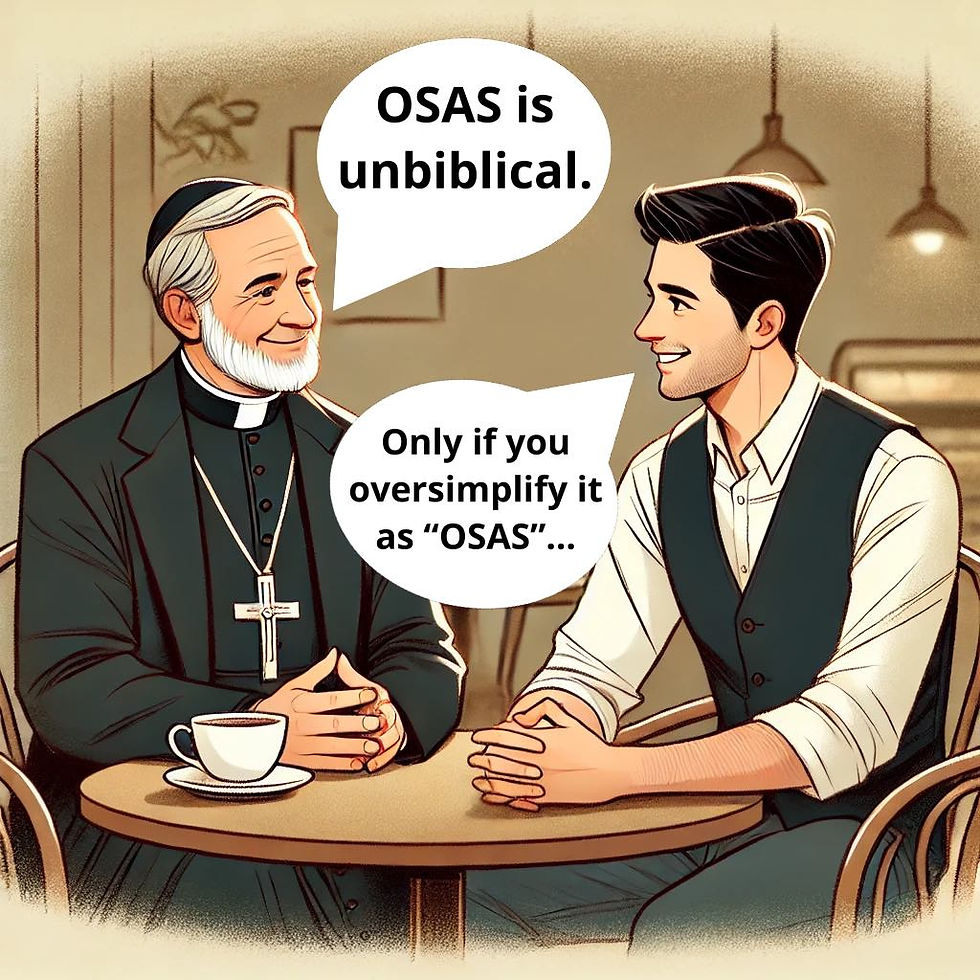Limited Atonement: Can God command us to lie?
- Bible Brian

- Jul 18, 2021
- 3 min read
Updated: Jul 31, 2023

Of all of Calvinism's 5 points, Limited Atonement is the one that least fits with the scriptures. There are several reasons for this, the biggest of which is that it is not clearly taught. It is not taught explicitly, as there are no verses that say the atonement is limited. It is not taught implicitly, because there are no verses which, taken to their logical conclusions, suggest atonement is limited. There are even some very explicit statements that say Christ is the propitiation for the sins of the whole world. In order to get around these, Calvinists must argue that "the whole world" does not mean "the whole world".
Further evidence against Limited Atonement comes from the Great Commission. The Great Commission, as described by Matthew, is "Go ye therefore, and teach all nations, baptizing them in the name of the Father, and of the Son, and of the Holy Ghost: Teaching them to observe all things whatsoever I have commanded you: and, lo, I am with you always, even unto the end of the world. Amen." (Matthew 28:19-20). The extent of this is rather large. In fact, according to Mark 16:15, we are to "Go into all the world and preach the gospel to every creature."
Now, obviously, we have an issue here with the phrase "every creature". Clearly, bunnies aren't in view here. Nor tigers, nor giraffes, nor hippos, nor moose. This is why more modern translations render it "to all of creation". This presents us with a dilemma: Do we preach to those who will not accept it?
The obvious answer to this is yes. God does not even tell us who will accept it, and so we don't have the knowledge or the authority to discriminate. We can't say to one person "ok, you're part of the elect, here's the Gospel", then turn to another and say "you know, I don't think you're elect, so I won't give you the Gospel." We must take the Gospel everywhere we go, and because of this, it is inevitable that we will preach the Gospel to those outside of the elect. The problem we have now, however, is that because we cannot discriminate, we are preaching to the unelect as if they were elect. We are telling these people "Believe on the Lord Jesus Christ, and thou shalt be saved" (Acts 16:31).
But if Limited Atonement is true, that is a lie! If you tell someone for whom Christ has not atoned "Christ has atoned for you, here's how you receive that", you are lying to them. But God can neither lie Himself (Titus 1:2), nor can He tempt anyone to sin (James 1:13), which lying is. Because lying is a sin, God cannot command you to lie. But if Limited Atonement was true, "preach the Gospel to all creation" would be a direct command from God to lie to the unelect.
You see the problem here. In order for Limited Atonement to be true, God would have to greatly alter the Great Commission. The Great Commission wouldn't be "preach the Gospel to all of creation", but "preach the Gospel to all the elect", followed by instructions on how to detect the elect.
But as it stands, the Great Commission is to preach the Gospel to all of creation (i.e. all people). The reason for this is that all people can be saved. If a Christian in 2001 was to approach, for example, Christopher Hitchens, who died as an atheist in 2011, and say "if thou shalt confess with thy mouth the Lord Jesus, and shalt believe in thine heart that God hath raised him from the dead, thou shalt be saved" (Romans 10:9), that would be 100% true, and not a lie. Obviously, we now know that Christopher Hitchens was not elect, because he did die in his unbelief, and is now receiving due penalty for his error. But in 2001, Christians were praying for him, and preaching to him, and none of them were lying, because Christopher Hitchens, if he did indeed confess and believe, would have been saved. But if Limited Atonement was true, he could have believed, yet still not been saved.
Limited Atonement, therefore, brings with it a major theological conflict: That of a lying God. Or at least, if God Himself is not a liar, He commands us to lie. Yet, scripture presents a God who can neither lie, nor even tempt us to lie. If God can neither lie, nor tempt us to lie, then Limited Atonement must be false. Those who reject the Atonement Christ offers to them reject that Atonement, not because it was not offered, but because it was not an offer desirable to them. Limited Atonement must necessarily be false. Otherwise, something in scripture is.
Recommended song: Mercy Me - All of Creation






Comments